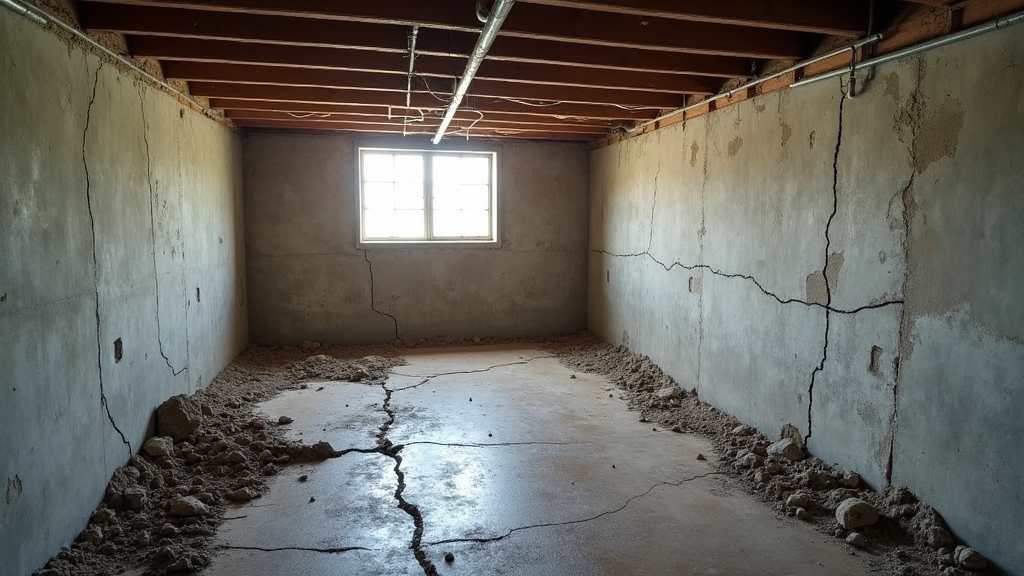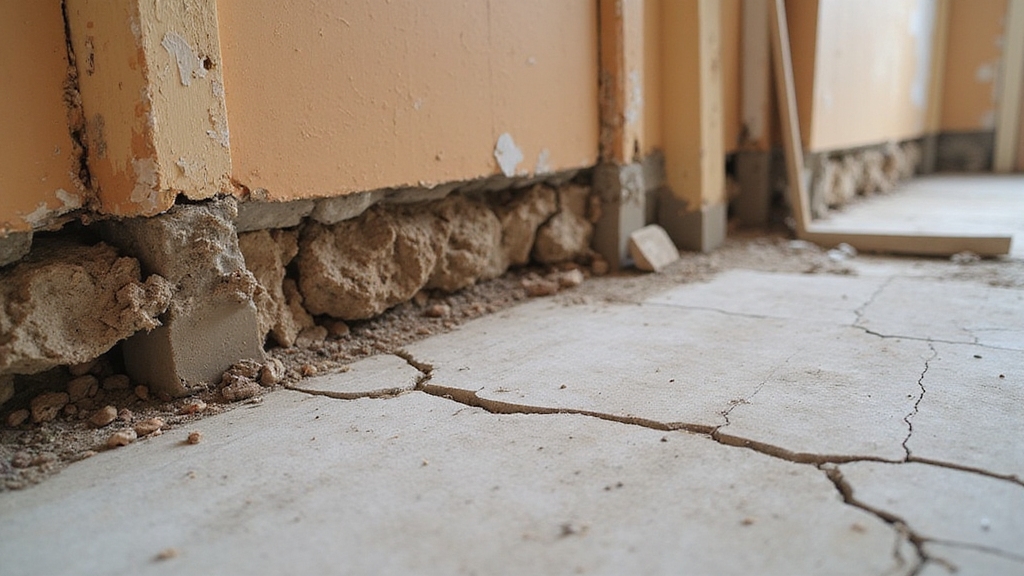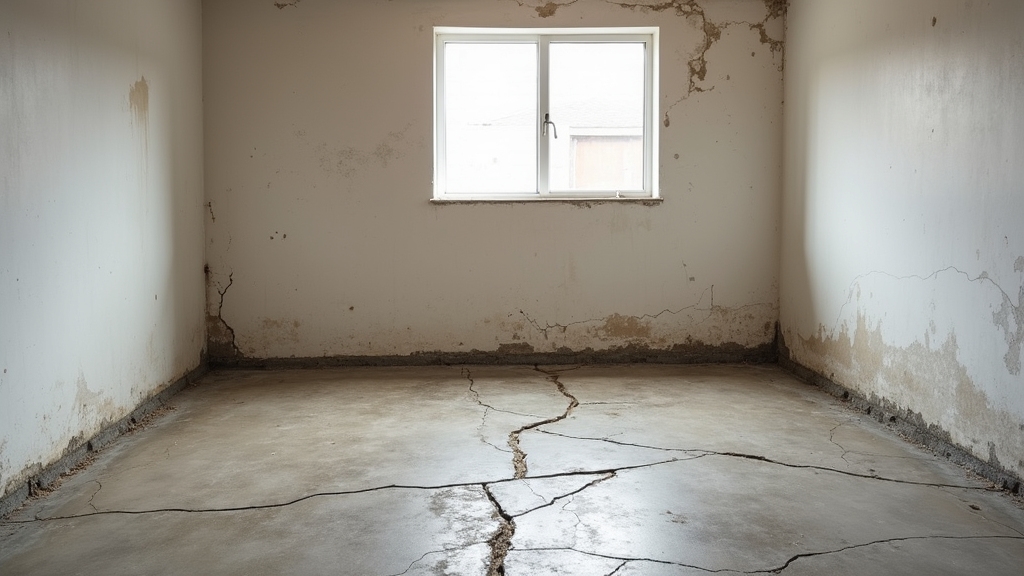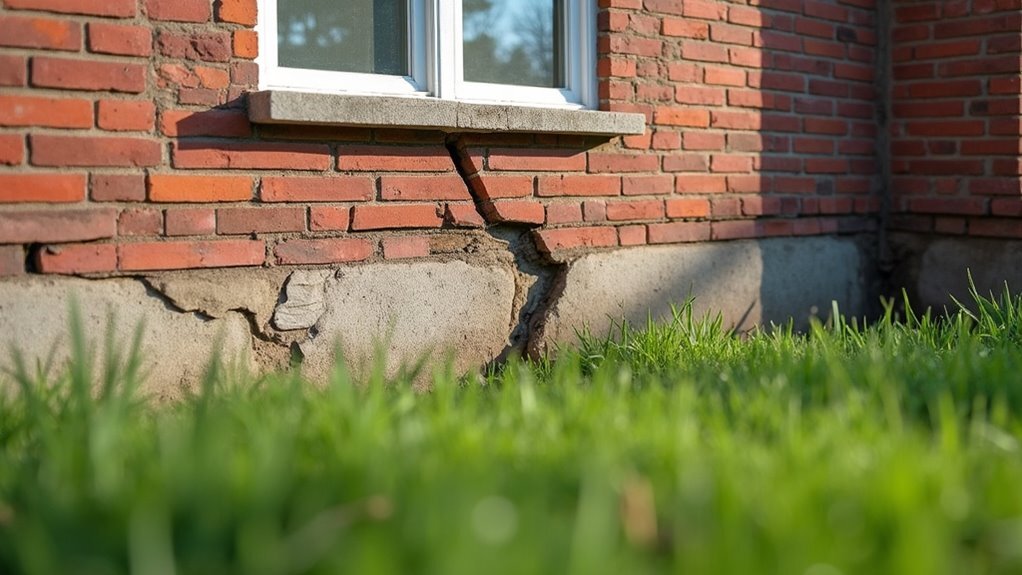Many homeowners worry about what foundation problems mean for their home’s value. Cracks, uneven floors, or sticking doors can make buyers nervous. These issues can make selling your home much harder.
Foundation problems often scare buyers away. They see potential repair costs and hidden risks. Homes with foundation issues usually sit longer on the market and attract lower offers.
The good news is you can do something about it. Foundation problems can lower your home’s value, but fixing them protects your investment.
Getting repairs done early helps you sell faster and for more money. This blog will show you how to spot, address, and overcome foundation issues before selling your home.
Key Takeaways
- Foundation problems typically lower a home’s appraised value and can lead to significant price reductions during sale negotiations.
- Visible foundation issues, such as cracks or uneven floors, reduce curb appeal and deter potential buyers.
- Severe foundation damage may cause mortgage lenders to reject loan applications or require costly repairs before approval.
- Required disclosure of foundation problems can expose sellers to legal risks and further decrease marketability.
- Prompt repairs and documented maintenance can help mitigate value loss and reassure buyers and appraisers.
Common Signs of Foundation Issues

Cracks in walls, uneven floors, and doors that stick are common signs of foundation problems. These signs can lower a property’s value and make buyers cautious. If you see these issues, the foundation may be shifting or settling.
A proper pricing strategy based on accurate assessments can help mitigate potential buyer concerns related to foundation issues. Soil movement under the house often causes these problems. The ground can push against the foundation, leading to cracks or sloping floors. An understanding of soil stability can help homeowners anticipate and address these issues early. Quick action is important if you want to avoid bigger repairs later.
If you notice these signs, contact a structural engineer for an inspection. A professional can recommend the right repairs to fix the issue. Solving foundation problems early can protect your investment and attract more buyers.
How Appraisers Evaluate Structural Damage
When an appraiser visits your property, they use specific visual inspection techniques to assess any structural damage. They’ll factor these findings directly into your home’s appraised value, which can influence your position in the market. Understanding this process helps you address issues proactively and protect your investment. Additionally, identifying potential title problems early can prevent delays or legal complications during the sale.
Visual Inspection Techniques
Visual inspection techniques help appraisers find foundation problems. Appraisers look for visible signs of structural damage. They check for cracks, uneven surfaces, and other issues that may affect a home’s value.
Cracks in walls, floors, and ceilings are important clues. Appraisers note their patterns and locations to judge the severity. They also look for sloping floors and doors or windows that do not close properly.
Moisture around the foundation is another warning sign. If there is water damage, it may suggest foundation distress. Inspectors also check if foundation materials like concrete or brick are cracked or moved.
Soil conditions around the house are important as well. If the soil is loose or expands, it can make foundation problems worse. Appraisers use these observations to form a full picture of the home’s structure.
If foundation problems are found early, repairs can be planned before damage gets worse. This careful inspection helps protect the home’s value. Appraisers rely on these methods to ensure accurate assessments.
Impact on Appraised Value
Foundation problems usually lower a home’s appraised value. Appraisers look for cracks, sloping floors, and doors that do not close. They compare your home to similar ones without these issues.
If the foundation shows damage, appraisers may lower your home’s value. The more severe the problem, the bigger the price reduction. Signs of soil movement can also make buyers and lenders worry.
You can reduce the impact by fixing settlement issues early. If you provide repair records and warranties, appraisers may see less risk. Professional reports help show that the problem is managed.
If you understand how appraisers review foundation damage, you can better protect your home’s value. Presenting evidence of repairs puts you in a stronger position. You may then negotiate more confidently with buyers and lenders.
Impact on Curb Appeal and Buyer Perception

Foundation problems can hurt your home’s curb appeal and change how buyers see it. Visible issues like cracks or uneven steps can worry buyers right away. These signs may lower your home’s value in their eyes.
Buyers may doubt the home’s strength if they see foundation problems. They might think repairs will be costly or hidden. If buyers expect extra work, they may offer less money or lose interest.
A house with foundation issues can look uncared for. If buyers notice this from the street, they may choose another home. This can make it harder to sell your property quickly. Strong bargaining power can help you negotiate repairs or price adjustments to address these concerns. Additionally, addressing foundation issues promptly can help maintain or even increase your home’s market value, making it more attractive to potential buyers.
The Cost of Foundation Repairs
You’ll find that foundation repair costs vary widely, with typical prices ranging from several thousand to tens of thousands of dollars. Factors such as the extent of damage, materials, and local labor rates all play a role in determining your final bill. While DIY solutions might seem cost-effective, comparing them to professional repairs can reveal hidden risks and long-term value considerations.
Additionally, opting for cash transactions can streamline the repair process and reduce delays associated with financing approvals. In some cases, working directly with cash buyers can facilitate quicker deals and reduce the need for lengthy loan approvals that might delay repairs.
Typical Repair Price Range
Foundation repairs usually cost between $2,500 and $8,000. The final amount depends on your home’s specific problems. Simple repairs cost less, while bigger fixes cost more.
Minor crack repairs may only cost $500 to $1,000. If your home needs piering or leveling, you might pay $3,000 to $7,000. Major structural repairs or soil work can cost over $10,000.
If you know these price ranges, you can plan your budget wisely. Homeowners should prioritize repairs based on urgency. If you wait, costs may go up.
Factors Influencing Repair Costs
Repair costs vary based on several key factors. Soil stability is important because shifting or weak soil can make repairs harder and more costly. If your home sits on stable ground, repairs are usually simpler and cheaper.
Foundation materials matter as well. Concrete, cinder block, or stone each need different repair methods, which affect the price. Bigger cracks or serious structural issues will always cost more to fix.
Damage location and foundation access can raise costs if workers have trouble reaching the problem. Regional labor rates also change what you pay. If you get a thorough inspection, you can spot issues early and plan your budget.
Comparing DIY and Professional
DIY and professional repairs have different benefits and risks. Professional help is often safer, especially for complex foundation problems. Choosing a professional can save time, money, and stress in the long run.
DIY repairs may seem cheaper at first. Hidden problems can be missed if you do not have the right skills. These mistakes could cause expensive repairs later.
Professional contractors understand soil and use the correct materials. Most professionals offer warranties that protect your investment. If you plan to sell your home, buyers usually prefer documented, professional repairs.
If you are unsure about the work, professional repair is the better choice. Doing the job right helps protect your home’s value. Always consider the long-term impact before choosing a repair method.
Negotiating Power for Buyers
You can use a home’s foundation problems to gain leverage as a buyer. These issues often lower the home’s value. If the seller understands this, you can ask for a lower price or money for repairs.
Repair estimates for foundation work and soil stabilization are important. Buyers should review these costs to support their requests. If estimates are high, you can push for bigger reductions.
Inspection reports are also useful in negotiations. Reports that show urgent foundation repairs give you more power. You can point out these issues to justify your offer.
Contractor estimates help ground your arguments. If the seller doubts the costs, you can show real repair quotes. This makes your negotiation stronger and more reasonable.
Additionally, understanding the sales contract terms related to repairs can give you further negotiating power by ensuring repairs are addressed before closing. Be aware that lack of transparency during negotiations can weaken your position, so insist on clear communication and detailed disclosures.
Disclosure Requirements and Legal Implications

You need to know that mandatory disclosure laws require you to report foundation issues, which can directly impact your transaction. If you fail to disclose, you risk legal claims from buyers and potential financial penalties. Understanding these requirements helps you protect your interests and ensures buyers have the legal protections they’re entitled to.
Additionally, disclosure requirements aim to promote transparency and fairness in property transactions, and being aware of home sale regulations can help you navigate the process more confidently.
Mandatory Disclosure Laws
Mandatory disclosure laws require home sellers to share any known foundation problems with buyers. Sellers cannot hide or delay sharing this information. These rules exist to protect buyers and keep the housing market fair.
If you know about foundation issues, you must say so early in the selling process. Early disclosure helps avoid surprises and meets legal requirements. Hiding issues can harm your reputation and lower your home’s value.
Sellers should keep clear records of any foundation problems and repairs. Proper documentation shows you followed the law and acted responsibly. If you follow these steps, you build trust and help your sale go smoothly.
Seller Liability Risks
Sellers face serious risks if they do not disclose foundation problems. Laws require sellers to share known issues, including settlement or soil problems. Hiding this information can lead to lawsuits or loss of the sale.
Buyers today look for signs of structural damage. If a seller hides defects, it can harm their reputation and weaken their position. Trust is lost quickly if buyers find undisclosed issues.
If you share information about repairs or engineering reports, you build trust. Proper disclosure can protect you from legal trouble. Honest sellers are more likely to close a smooth sale.
Buyer Legal Protections
Buyers have strong legal protections for foundation issues. Laws make sellers share any known foundation problems before closing. This helps buyers avoid surprise defects.
These protections matter because they prevent unexpected repair costs. Buyers can use this information to ask for a lower price or repairs. If sellers hide problems, buyers can take legal action.
Legal remedies can help recover money or cancel the sale if sellers mislead buyers. These rules make real estate deals fair. Buyers can feel more confident when making big decisions.
Mortgage Approval and Lending Challenges
Foundation problems can make mortgage approval difficult. Lenders worry about settlement and unstable soil because these lower property value. If an inspection finds foundation movement, most lenders need proof of repairs or may reject your application. Liens, such as tax or judgment liens, can also complicate the sale process and should be addressed beforehand.
Even after repairs, some lenders still see risk. They may ask for a bigger down payment or charge higher interest rates. This can limit your loan choices. To improve your chances, gather all repair documents and engineering reports. These papers should show the foundation is stable and the problem is fixed. If you give clear proof, lenders may feel more confident and offer better loan options. Additionally, location/land factors can influence how lenders assess the property’s safety and value, impacting your approval chances.
Insurance Complications Related to Foundation Damage
You’ll face real challenges with insurance when your home has foundation issues, as most policies have strict coverage limitations or outright exclusions for this type of damage. Claim denial risks are high, which can leave you with significant repair costs and impact your home’s marketability. To protect your investment, it’s smart to review policy details and investigate specialized coverage options early.
Additionally, understanding how foundation problems can influence your home’s value and marketability can help you make informed decisions during the selling process. Recognizing the importance of debt-free living benefits, such as speedy transactions and financial certainty, can also motivate homeowners to address foundation issues promptly to avoid further financial strain.
Coverage Limitations and Exclusions
Most homeowner’s insurance policies have strict limits and exclusions for foundation damage. Insurers usually only pay for repairs if the damage is caused by a covered event. Foundation repairs due to settling or normal wear are often not covered.
If your policy excludes certain foundation issues, you may face high repair costs. Buyers may also be less interested in your home if coverage is limited. Limited foundation coverage can make it harder to sell or refinance your house.
You should read your policy carefully to understand what is and is not covered. If you need more protection, consider buying extra coverage for foundation risks. Careful planning can help you avoid unexpected expenses.
Claim Denial Risks
Insurers often deny foundation damage claims for several reasons. Denials usually happen because of unclear policy terms or disputes about the cause of damage. If your claim is denied, you might face repair costs without help from your insurance.
Unexpected claim denials can lead to serious stress and worry. Insurance disagreements may cause frustration, while paying for repairs yourself creates financial pressure.
You can lower your risk of denial by reading your policy carefully. Always take clear photos and notes of any damage. If you have questions, consult an expert before filing your claim.
Effect on Comparable Home Sales
Foundation problems can make your home worth less than similar houses nearby. Buyers and appraisers notice these issues during comparisons. If your home has a history of foundation trouble, it can lower its value.
Potential buyers may ask for large discounts or decide not to buy. Appraisers may give your home a lower value than others in your area. If nearby homes do not have these problems, your home may not sell quickly.
If you fix the foundation problems early, it can protect your home’s value. Addressing these issues shows buyers that you care for your property. This can make your home more appealing in a competitive market.
Long-Term Maintenance Concerns
Long-term maintenance is necessary to keep your foundation strong. One repair does not guarantee lasting stability. Regular care helps protect your investment.
Homeowners should check for new cracks and shifting. Early attention to small problems keeps them from getting worse. Regular inspections help you spot issues before they grow.
Good soil care prevents future foundation problems. Proper drainage and steady moisture levels are important. Landscaping should guide water away from the foundation.
If you document your maintenance, buyers and appraisers will see less risk. Proper upkeep keeps your home safe and valuable. Long-term care protects your property’s strength and appeal.
Regional Factors Influencing Foundation Stability
Regional factors can strongly affect your foundation’s stability. Soil type and local weather are important for how long your foundation lasts. Home value can drop if these conditions cause problems.
Certain soils, like clay, expand and contract with moisture. If the soil shifts, your foundation may crack or settle unevenly. This leads to structural issues and visible damage.
A wet climate or frequent flooding raises the risk of water getting into your foundation. Water can weaken your home’s base over time. These problems are more common in humid or rainy regions.
Some areas are known for having foundation troubles. If buyers hear about these issues, they may avoid purchasing homes there. Property values may fall as a result.
If you address these risks early, you protect your home and its value. Checking soil and drainage can help prevent larger issues. Early action is key for keeping your foundation strong.
Role of Home Inspections in the Selling Process
A home inspection is important when selling a house. It gives buyers a clear report on your property’s condition. If you get an inspection early, you can fix problems before listing.
Inspectors can find issues like foundation damage. They may recommend repairs or reinforcement. If you address these early, buyers may feel more confident.
An inspection report can help you set a fair price. Sellers with inspection reports are seen as honest and open. This can make negotiations smoother if any problems come up.
If you know your home’s condition, you can plan your selling strategy. Early inspections help you handle buyer questions with facts. This can increase your chances of a successful sale.
Strategies for Mitigating Value Loss
Foundation problems can lower your home’s value. You can take steps to reduce this loss and keep your home attractive. Early action helps you protect your investment.
Strong repairs like underpinning or installing piers can stabilize your home’s structure. If buyers see recent improvements, they may feel more confident. Reinforcement shows you care for the home.
Improving the soil around your house prevents future movement. Techniques include chemical injections or better drainage systems. If you fix soil issues, you lower future risks.
Keeping records of all repairs and warranties is important. Detailed paperwork helps prove you fixed the problems. If you provide these documents, buyers may trust your home more.
Weighing Repair Costs Versus Selling As-Is
If you are deciding between more repairs or selling as-is, compare the costs and possible profits. Look at local home prices and buyer preferences. This helps you see if repairs will add enough value.
If major repairs remain, get quotes from professionals. Calculate if these repairs will raise your selling price more than their cost. Some buyers may want a ready home, while others prefer a lower price.
Consult a real estate agent who knows about homes with foundation issues. If you skip more repairs, expect to lower your asking price. Weigh your repair costs against the price you may get if you sell as-is.
Conclusion
Foundation problems can significantly affect your home’s value and how buyers perceive your property. If you address these issues early, you can avoid bigger challenges during the selling process. Proper repairs and documentation can help you protect your investment.
If you need to sell quickly or want to avoid costly repairs, we buy houses for cash in any condition. Limitless Homes of KC offers a simple and straightforward solution for homeowners facing foundation concerns. You can sell your home as-is without the stress of lengthy repairs.
If you are ready to move forward, we are here to help. Contact Limitless Homes of KC today to get a fair cash offer for your property. Let us take the hassle out of selling your home.

